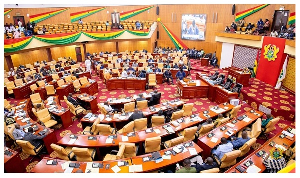It appears as though the mechanisms of governance and societal order are faltering in our Republic. Each day, citizens rise early and engage in activities driven solely by personal whims, with little regard for the rule of law or the principles of common sense.
This troubling trend, observed across many African nations, is degrading our richly endowed continent into a semblance of a banana republic. Such a spectacle is intolerable and demands immediate rectification.
The responsibility to initiate change rests squarely on the shoulders of the intelligentsia, the educated elite, and all conscientious citizens of Ghana. It is imperative that we awaken from our silence and apathy to actively defend the rights and duties outlined in the 1992 Constitution of Ghana.
Our collective voice and action are crucial in upholding these fundamental principles.
A Rallying Cry to the Youth of Ghana
Ghanaian youth, it is time to rise for your country. The nation calls for your unwavering dedication. Let us come together in unity to fortify our homeland, ensuring that it becomes a bastion of strength and greatness.
The task of nation-building is a shared responsibility, demanding our full involvement and commitment.
By embracing this charge, we can steer our country back onto the path of lawfulness and prosperity, thereby securing a brighter future for generations to come.
Historical Accounts of African Nations Experiencing Citizen Apathy Leading to Chaos
Several African countries have experienced periods where apathy and disengagement from the citizenry precipitated significant turmoil and chaos. These historical precedents highlight the importance of civic engagement and the dire consequences of its absence.
1. Somalia
In the late 1980s and early 1990s, Somalia descended into chaos following the collapse of the Siad Barre regime. The regime's downfall was precipitated by widespread disillusionment and apathy among the populace, who were weary of rampant corruption, human rights abuses, and economic mismanagement.
The resulting power vacuum led to a devastating civil war, marked by clan-based conflicts and the rise of warlordism. The lack of effective governance and civic participation plunged the nation into decades of anarchy and instability.
2. Liberia
Liberia's descent into chaos during the late 20th century is another stark example. The prolonged misrule and corruption of Samuel Doe's regime led to widespread disenchantment among Liberians. This apathy culminated in the outbreak of civil war in 1989, spearheaded by Charles Taylor.
The conflict, fuelled by ethnic tensions and lack of citizen engagement in governance, resulted in horrific atrocities and a near-total collapse of the state. It took years of international intervention and peacebuilding efforts to restore some semblance of order.
3. Rwanda
The 1994 Rwandan Genocide stands as one of the most tragic instances of what can happen when citizen apathy and governmental collapse coincide. Years of ethnic propaganda, political manipulation, and a lack of civic resistance to growing tensions resulted in a brutal and rapid genocide.
The horrific events unfolded in a context where many Rwandans felt powerless or indifferent to the escalating hate rhetoric. The genocide led to the deaths of approximately 800,000 people and left the country deeply scarred.
4. Zimbabwe
Zimbabwe offers another illustrative case. The latter part of Robert Mugabe's rule saw increasing political apathy among citizens, driven by severe economic decline, hyperinflation, and widespread corruption. As public engagement waned, the government's authoritarian practices went largely unchecked, leading to further economic devastation and social unrest.
The culmination of these issues resulted in the near collapse of the economy and severe humanitarian crises, prompting significant regional concern and intervention.
5. Democratic Republic of the Congo (DRC)
The DRC has faced prolonged periods of instability and conflict, particularly in the aftermath of the Mobutu Sese Seko regime. Mobutu's kleptocratic rule led to economic collapse and widespread disenchantment.
Following his ouster, the country experienced a power vacuum that plunged it into one of the deadliest conflicts since World War II, involving multiple armed groups and regional actors. The lack of effective governance and civic engagement has perpetuated cycles of violence and instability.
These historical examples underscore the critical importance of active civic engagement and robust governance structures. The apathy and disengagement of citizens in the face of corrupt or ineffective leadership can lead to devastating consequences, including prolonged conflict, economic ruin, and humanitarian crises.
As Ghana and other African nations navigate their contemporary challenges, these lessons from the past serve as powerful reminders of the need for vigilance, participation, and the collective safeguarding of democratic principles and the rule of law.
Recommendations for Addressing Civic Apathy and Preventing Chaos
To prevent the descent into chaos witnessed by some African nations due to civic apathy, a multifaceted approach is essential. The following recommendations aim to bolster civic engagement, enhance governance, and promote stability.
1. Strengthen Civic Education
Promote comprehensive civic education programs that inform citizens about their rights and responsibilities. Educating the populace on the importance of participation in democratic processes and the impact of their involvement can foster a more engaged and active citizenry.
2. Enhance Transparency and Accountability
Implement stringent measures to ensure transparency and accountability in governance. Establish independent anti-corruption bodies with the power to investigate and prosecute corruption cases. Regular audits and public disclosures of government spending can help build trust in public institutions.
3. Encourage Political Participation
Create platforms for meaningful political participation at all levels. This includes supporting free and fair elections, promoting political pluralism, and ensuring that marginalized groups have a voice in decision-making processes. Engaging citizens in local governance can also enhance their sense of ownership and responsibility.
4. Strengthen Civil Society
Support the development of a vibrant civil society that can act as a watchdog and advocate for the public interest. Encourage the formation of non-governmental organizations, community groups, and grassroots movements that can mobilize citizens and hold the government accountable.
5. Promote Economic Development and Social Welfare
Addressing economic disparities and improving social welfare can reduce the sense of disenchantment and apathy among citizens. Implement policies that promote job creation, access to quality education, and healthcare services. Economic stability and social security are vital for fostering a sense of hope and involvement among the populace.
6. Foster Inclusive Governance
Ensure that governance structures are inclusive and representative of the diverse population. This involves promoting gender equality, ethnic diversity, and the inclusion of youth in political and administrative roles. An inclusive government is more likely to be responsive to the needs of all citizens.
7. Leverage Technology for Engagement
Utilize technology to enhance civic engagement and government accountability. Digital platforms can facilitate communication between the government and citizens, provide access to information, and enable online participation in policy discussions. E-governance initiatives can streamline services and make government processes more transparent.
8. Support Independent Media
A free and independent media is crucial for informing the public and holding authorities accountable. Protect the rights of journalists, prevent censorship, and support media outlets that provide unbiased and accurate reporting. An informed citizenry is better equipped to engage in democratic processes.
9. Implement Legal and Institutional Reforms
Reform legal and institutional frameworks to ensure they support democratic principles and the rule of law. Strengthen judicial independence, protect human rights, and ensure that laws are applied fairly and consistently. Robust institutions can provide a stable foundation for governance and civic engagement.
10. Foster National Unity and Social Cohesion
Promote initiatives that build national unity and social cohesion. Encourage inter-ethnic and inter-religious dialogue and implement policies that address historical grievances and promote reconciliation. A united populace is more resilient to divisive tactics and more likely to work together towards common goals.
Conclusion
Addressing civic apathy and preventing chaos requires a holistic and sustained effort involving various stakeholders, including the government, civil society, and the international community. By implementing these recommendations, African nations can foster a more engaged citizenry, enhance governance, and build a stable and prosperous future.
Opinions of Saturday, 27 July 2024
Columnist: Earl Asante















